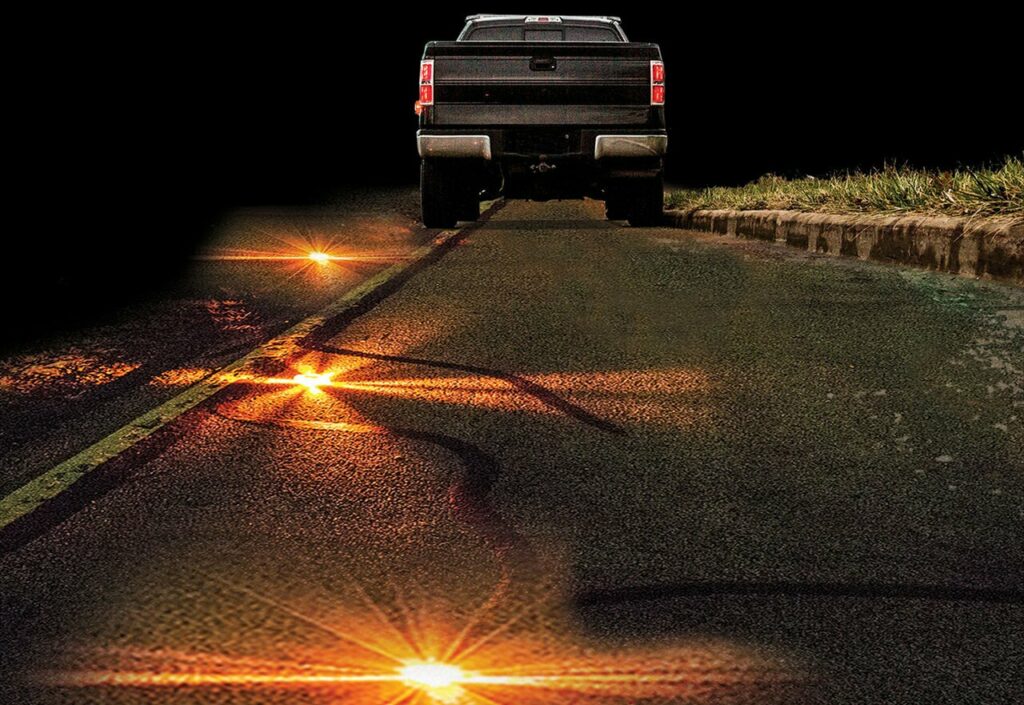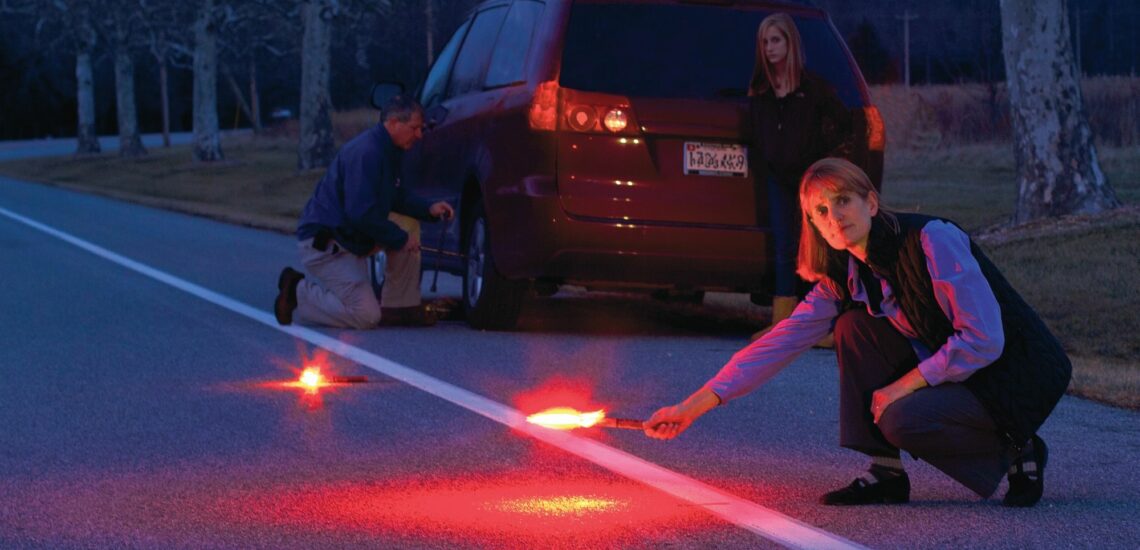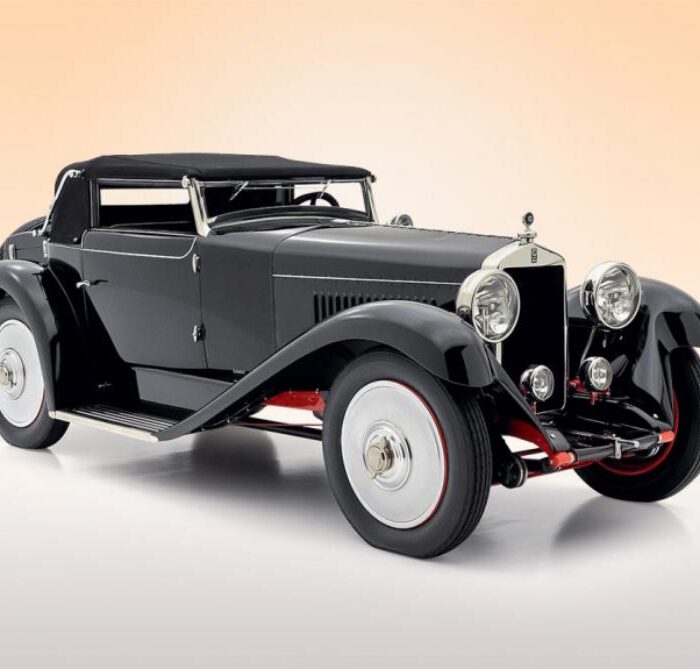Imagine that you get caught in a thick fog. And you don’t just get caught, but find yourself on the side of a freeway in a broken-down car. The situation is not so rare. Cellular communication is intermittent. How can you inform the rescuers or other motorists about yourself? Such a wonderful thing called a road flare will come to the rescue. Let’s try to understand what automotive pyrotechnical devices are, why Japanese cars always have one specified device in the factory configuration, and how to use it correctly.
Japanese invention of a signal device
The Land of the Rising Sun, as Japan is called, is in such climatic conditions that heavy fogs are common. Accordingly, visibility in foggy weather is almost zero. In winter, in turn, you can get into a heavy snowfall not only in Japan, and driving in such a situation is no less difficult than in a thick fog. In such cases, the road flare will warn other road users about the danger or attract attention, thereby rescuing the driver who is in trouble. The obligation of mandatory presence of the pyrotechnical product in the car is provided for by Japanese law. Therefore, already at the stage of factory configuration, all Japanese cars are equipped with a special flare. It is located right next to the driver, namely, near the foot on a special mount. This is a very useful accessory to ensure safety in the event of an extreme situation. With the help of a signal light, you can create additional lighting in the dark. Sometimes a road flare is called a signal pistol (although this, of course, is not right). Another name for this device is a fusee. Such a device is not found in American or European cars. And Japanese four-wheeled “friends” are necessarily equipped with emergency signaling devices, and they are forbidden to be stored somewhere in a “glove compartment” or trunk. Only at hand (or rather, under the driver’s left foot – of course, in a right-hand drive car). A distress signal is always sent if an accident occurred in a sparsely populated area or in poor visibility conditions.
Why does a car need an emergency accessory?
Any car has a loud horn, a powerful battery that feeds bright headlights, and hazards. Wouldn’t it be superfluous to carry automotive pyrotechnics? However, if you get into an accident, the battery may be damaged. But even if it happened that it remained safe and well, the usual car lights, horn and alarm sounds are too familiar to attract anyone’s attention (unless, of course, it is not the slopes of Mount Everest or the dunes of the Gobi Desert). But a person waving his hand with a bright flare attracts the attention of others immediately, and the effect will be much better than if you just wave your hand or scarf in front of a train or other car. In addition, it is possible to scare away wild animals with a flare if the accident occurred in a deserted area. Therefore, there are never too much automotive signal pyrotechnics. The main thing is that they are in working order.
How to use a signalling device (road flare)
Before you use a road flare, you need to check some data. The first step is to look at the expiration date of the flare. It is usually usable for about five years from the production date. It is highly recommended not to use the flare if it has already expired.
The flare is lit with the help of a regular thread, which is provided in the road flare kit. Note that the device operates on the principle of a firecracker. The element can burn bright red for more than five minutes. In addition, some types of flares can burn even under water. A long-burning flare allows you to confidently send a signal, without bothering with the calculation of time and distance under stress.
Japanese road flare is made in a cylindrical shape and is located in a red case, that is, the flare is a case made of thin and soft red polyethylene, inside which there is a two-layer plastic-cardboard tube with a fuel charge. The cylinder itself contains various chemicals inside, which begin to glow bright red after ignition.
First, remove the tube-case, fixing it on the flare’s body. Now the tube is turned into a handle, and you can hold the flare in your outstretched right hand. External sources of fire are not needed. Even if the driver doesn’t have matches or lighters, he can light the flare without them. You should remove the lid with the left hand, then turn it and scratch with a fixed grater on the working phosphorus head. The road flare starts burning and it is better to turn it at an angle of 45 degrees downwind or hold it horizontally – there will be too many burning sparks and combustion particles. If there are snowdrifts around, you can push the flare directly into the snow.
There is a graphic instruction on the red body of the pyrotechnical device, so it’s not necessary to know Japanese to use the flare.

What if a driver is locked in a car?
Sometimes there are accidents in which car doors jam shut, and mechanisms of window lifters fail. You can’t light the flare inside the car. In such a case, right at the end of the flare under the easily removable cap, there is a massive and sharp steel tip – a window breaker. Using it as a pike, you can break the most durable car glass, and, sticking out your hand, give an emergency signal (if you still can’t get out of the car). The flare will burn brightly even under water (if the car flew off the road into a river or lake), and witnesses of the accident will see the location of the sunken car.
What problems might arise?
Japanese road flares can grow damp. In conditions of high humidity, the case of the device, which is not sealed, easily absorbs water vapor. Therefore, the ability to quickly ignite and burn for a long time may be lost.
It should also be remembered that this thing, located in the car, is easily flammable. Overheating of the interior in summer, for example, in a parking lot that is not protected from the sun, can provoke the ignition of the road flare, and as a result, the car will be damaged.
The Japanese are sure to test such devices, developing them for the domestic market. Car factories have certain regulations and their own standard of requirements for road flares and even for how and where to mount them. In no case should the lit product be placed vertically. In this position, flying sparks can get on the hands and clothes of the driver. This will cause burns and ignite clothes.
Another important point: an expired flare behaves unpredictably. Hoping for it in an extreme situation is like playing roulette. It may work in normal mode, or it may fail. Therefore, it is always necessary to change this device in time, if it’s about to expire. There were cases when the expired device even ignited spontaneously.
Don’t skimp on safety, the cost of a new Japanese flare today is not prohibitive (less than $10).
By the way, similar devices are produced not only in Japan, but also in China and Russia. However, the main difference from Japanese road flares is the method of igniting a chemical candle – for this purpose, a thread cord with a ring on the end is installed in the body. You should pull the ring and the flare will ignite. This method is even more effective than the Japanese design, because it is easier to pull the ring than to remove the lid, turn it, and aim to scratch the phosphorus head. After all, you can easily drop the lid in an extreme situation, and it won’t be easy to find it in the dark or in deep snow.

Well, when getting behind the wheel, you should check the presence of not only the road flare, but also a driver’s license. It can be either national or international. The latter is much more convenient. And if you still don’t have the international driver’s license, we invite you to process it directly on our website. You won’t spend a single minute of extra time, but you will own a driver’s license that will allow you to drive on the roads of most countries in the world. Don’t miss this opportunity!

Published March 18, 2021 • 6m to read






